- Home
- Priscilla Royal
Wild Justice
Wild Justice Read online
Wild Justice
A Medieval Mystery
Priscilla Royal
Poisoned Pen Press
Copyright
Copyright © 2018
First E-book Edition 2018
ISBN: 9781464209369 ebook
All rights reserved. No part of this publication may be reproduced, stored in, or introduced into a retrieval system, or transmitted in any form, or by any means (electronic, mechanical, photocopying, recording, or otherwise) without the prior written permission of both the copyright owner and the publisher of this book.
The historical characters and events portrayed in this book are inventions of the author or used fictitiously.
Poisoned Pen Press
4014 N. Goldwater Boulevard, #201
Scottsdale, Arizona 85251
www.poisonedpenpress.com
[email protected]
Contents
Wild Justice
Copyright
Contents
Dedication
Acknowledgments
Epigraph
Chapter One
Chapter Two
Chapter Three
Chapter Four
Chapter Five
Chapter Six
Chapter Seven
Chapter Eight
Chapter Nine
Chapter Ten
Chapter Eleven
Chapter Twelve
Chapter Thirteen
Chapter Fourteen
Chapter Fifteen
Chapter Sixteen
Chapter Seventeen
Chapter Eighteen
Chapter Nineteen
Chapter Twenty
Chapter Twenty-one
Chapter Twenty-two
Chapter Twenty-three
Chapter Twenty-four
Chapter Twenty-five
Chapter Twenty-six
Chapter Twenty-seven
Chapter Twenty-eight
Chapter Twenty-nine
Chapter Thirty
Chapter Thirty-one
Chapter Thirty-two
Chapter Thirty-three
Chapter Thirty-four
Chapter Thirty-five
Chapter Thirty-six
Chapter Thirty-seven
Chapter Thirty-eight
Chapter Thirty-nine
Chapter Forty
Author’s Notes
Bibliography
More from this Author
Contact Us
Dedication
To Diana Smith-Reed, a dear friend,
who introduced me to the works of Sharon Kay Penman.
Acknowledgments
Patrick Hoi Yan Cheung, Christine and Peter Goodhugh, Maddee James, Henie Lentz, Dianne Levy, Paula Mildenhall, Sharon Kay Penman, Barbara Peters (Poisoned Pen Bookstore in Scottsdale, AZ), Robert Rosenwald and all the staff of Poisoned Pen Press, Marianne and Sharon Silva, Lyn and Michael Speakman
Epigraph
“No passion so effectually robs the mind of all its powers of acting and reasoning as fear.”
—Edmund Burke,
On the Sublime and Beautiful (1757)
Chapter One
The mist was soft as baby’s tears, but the air was as chill as death.
A small party of riders trudged through the muddy ruts and puddles of the well-traveled route. Tall grass and the occasional thick hedge lined the road, now and again encroaching upon it and forcing the armed men to pull their horses closer to the three monastics they protected. As they tried to maintain a respectful distance from the two women, the tall, broad-shouldered monk changed the pace of his horse to make the soldiers’ adjustment easier.
Prioress Eleanor shivered, then urged her donkey to a faster gait. Glancing up at Brother Thomas riding just ahead of her, she noticed how the drizzle lay like silver drops on his thick woolen cloak.
Although God might be their ultimate protector, she found an earthly comfort in the strength of this monk. He had been in her service for twelve years, and she knew his gentle nature well, but she could still imagine him leading men into battle like her brother, Baron Hugh of Wynethorpe.
Perhaps it was fortunate, for her peace of mind, that she could not see his face at this particular moment. As he gazed silently into the gloomy haze, his expression was somber for a man who, after many years, had finally learned to smile.
Prioress Eleanor had concerns enough with her talented sub-infirmarian, Sister Anne, who was riding beside her. Although the woman’s countenance was hidden, her head covered with a hood against the weather, Eleanor noted with apprehension how thin her friend had grown and how she hunched over her horse, gripping the reins with pale fingers.
I pray she has not fallen ill during this journey, the prioress thought. The ride from Wynethorpe Castle on the border with Wales to Somerset had been cold and arduous.
But Sister Anne had never complained, and her demeanor suggested that even a kind query about her health would be quickly dismissed.
“Fishponds, my lady.” Brother Thomas glanced over his shoulder and gestured to the right. “We should arrive soon.”
Through the tall but rain-laden grass, she could see them, so large they looked like small lakes that were filled to near-flooding after the deep winter snows had begun to melt. A few weeping willows stood guard along the banks. Their branches, heavy with God’s tears, touched the earth. She closed her eyes and offered a silent prayer of thanks that they were finally close to this journey’s end.
The road curved sharply around a tall hedge. Through the apple-green grass and behind the drooping boughs of the ancient willows, she could see the dark stone walls of the priory.
“Mynchen Buckland,” Thomas said, loud enough for all to hear. “The Hospitallers will greet us with a warm fire and mulled wine to chase away our chill.”
Eleanor smiled. Rarely had she felt such relief to arrive at a destination she had never wished to visit.
***
Hidden in the thick curtain of the tree branches near the fishponds, a tall man watched the party of travelers disappear through the gates of the women’s preceptory. Emblazoned on the left shoulder of his black robe was the eight-pointed white cross of the Hospitallers. His right sleeve, empty below the elbow, flapped awkwardly against his body in the subdued breeze. In his left fist, he grasped a thick walking stick.
Suddenly, he dropped the staff and clutched his mutilated arm to his chest. Whimpering like a colicky babe, he begged God to end the pain that shot like a lightning bolt through the stump where his hand had once been. At least no one could hear his moans and mock him for giving voice to his agony. For that, he was grateful.
As the pain eased, he took a deep breath and sent thanks to God. Indeed, he owed gratitude to Him for other reasons besides the easing of this pain. No longer did he have to dread that someone would reveal how his lower arm had been cut off. They were either dead or otherwise silenced, and that was a profound blessing.
Yet the arrival of these particular monastics at the nuns’ house upset his newfound peace. Their reputation for holding up bright candles and bringing light to corners best left dark was well known. If God chose to be kind, the troublesome visitors would accomplish the task that had brought them here and leave after a single night of hospitality and rest. He did not want Prioress Eleanor and her clever monk to linger.
“May You send them back to Tyndal Priory before they find any reason to grow curious,” he whispered into the mist.
Another jagg
ed pain struck him, and he knew he must return to his chamber where a numbing draught of poppy syrup and wine awaited him. If he tarried any longer, the pain would become unbearable.
Wincing, he swept up his staff, thrust his stump inside his robe where he could press it against the soothing warmth of his body, and followed the uneven path along the banks of the fishponds. With impatient swipes of his walking stick, he pushed aside the wet grass and offered silent pleas to God.
Only once did he slip in the mud, but he quickly regained his balance and soon vanished into the fog.
***
Clumps of black clouds lumbered overhead. The air grew heavier, and large drops of rain began to fall from the slate-colored sky. Above the din of the rattling downpour, a howling could be heard from an angry squall of wind. It began to lash the tender leaves of trees and pummel the walls that protected the inhabitants of Mynchen Buckland Priory of the Order of the Hospital of Saint John of Jerusalem.
Chapter Two
The small room outside the audience chamber of the Hospitaller prioress was comfortable.
The wait for her to welcome the travelers was not.
Stiffening her back, Eleanor fought to control her temper. Not only had her brother sent timely word to Prioress Amicia that the Prioress of Tyndal would arrive here to present Mynchen Buckland with his gift of rents from the Wynethorpe estates, but she herself had sent a messenger with the specific date of arrival. Her brother’s grant, and the knowledge that Baron Hugh had fought in Outremer, should have guaranteed an eager welcome by the woman who ruled this priory in an Order renowned for its hospital at Acre and its brother knights who battled against the infidels.
Her face grew hotter with fury, and she glanced at Brother Thomas.
He paced as if to restore feeling to legs grown stiff after the cold day’s long ride. Although he rarely showed impatience, his narrowed eyes suggested he was also less than pleased with the delay.
His own temper must be steaming as much as his robes are, she decided with a short-lived amusement.
Next to her, Sister Anne sat on the bench, a cup of mulled wine clutched in her trembling hands. Despite the crackling fire, the nun shivered in her wet clothing. She tentatively sipped at the wine, and then put the mazer down on a nearby table as if the weight of the cup had become too heavy. Against the pallor of the rest of her face, her cheeks were flushed.
Now truly worried, Prioress Eleanor bent close to whisper an anxious question.
The nun shook her head. “Now that we have this lovely fire, I shall be warmer soon, my lady, and the wine is restorative.” As if offering a compromise against further inquiry, she placed her hand around the cup and, with a thin smile, pulled it slightly closer.
The fire snapped and danced. The trio continued to wait, soaked to the bone, hungry, and weary. The door to Prioress Amicia’s chambers remained intractably closed, guarded by a grim-faced nun.
A tall, sullen young woman in a plain robe now offered to refill their cups with mulled wine.
With an uncharacteristically sharp tone, Eleanor refused it.
Her eyes ached. At least the soldiers had been sent off to assigned quarters and their horses tended, the prioress thought, but this inexplicable delay in properly welcoming her gift-bearing party of monastics was galling beyond endurance.
Once again, she looked at the black-robed nun who defended the closed door and was uncomfortably reminded of Sister Ruth, her nemesis at Tyndal Priory. How unjust, she thought, looked again, and noted that the only true resemblance between the two was this woman’s frown.
A foul temper will accomplish nothing, she decided, and tried to regain some calm. To distract herself, Eleanor turned her attention to their fellow unfortunates who were also waiting for Prioress Amicia to deign to see them.
One man had fallen asleep in a corner near the fire. The heat intensified his sour sweat that mixed with the musty odor coming from his mildewed clothing. His mouth had dropped open, and loud snores punched the air.
Eleanor suspected that his breath was probably foul as well. The few teeth she could see were discolored or dark with rot. That was certainly an uncharitable observation, she said to herself, and sighed. Her attempt to banish her sinful temper had not succeeded as hoped. Unkind thoughts were no less wicked.
She turned her attention to the other person in the room.
An elderly woman was sitting on a bench near the odiferous man. After the last burst of grating snores, she dragged herself to her feet and, with the aid of a thick piece of wood, hobbled across the room.
Eleanor gestured to her. “Come sit with me at the table, Mistress. It is still warm here but not as…” She discreetly gestured toward the sleeping man and smiled.
Despite having no teeth at all, the aged woman grinned with good humor and eased herself down on the bench. After eyeing her companion up and down, however, her amused expression changed as she realized that the woman with whom she had hoped to amiably gossip was one of significant religious rank.
“I meant no ill, my lady. He’s the nuns’ steward, a good man to the tenants and always charitable to widows like me. I’m sure he’s weary. He’s been waiting since early morning to see Prioress Emelyne.”
“Prioress Emelyne? I was told Prioress Amicia was the leader here.”
“Aye, but not now.” The widow looked around and then whispered, “You have not heard what has happened?” Her eyes widened hopefully.
Eleanor shook her head and quickly gestured for the tall maid to bring her companion a cup of wine.
The task was done promptly but with little grace.
Inching closer to the prioress, the widow leaned toward Eleanor’s ear. “As I heard the tale, Prioress Amicia was convicted of killing a woman not long ago. While she awaits sentencing by the Hospitaller Prior of England at Clerkenwell, she remains imprisoned here. Prioress Emelyne was chosen by the nuns to take her place until her fate is determined, but no one doubts the new prioress will remain in charge afterward.”
Eleanor’s first response was disbelief. “What was the source of that tale?”
“It’s true enough, my lady! I can assure you of that.” Like a mother might with a child, she patted Eleanor’s arm to convey confidence in the story’s veracity. “From your dress, I see you are not a member of this Order and assume that your priory is not nearby.” She smiled, not hiding her curiosity. “I do not recognize your habit, but the wool is fine and does not smell of sheep. I assume you must be of high rank in your own Order?”
“I am from Tyndal Priory near Norwich and belong to the Order of Fontevraud.”
With head bowed, the woman sighed. “I know it not, I fear. There are so many Orders these days. It was simpler when most religious were Benedictines or Augustinians with the occasional Cistercian. But I know you all do God’s work,” she said with a swiftly reverential tone. “And in this wicked world, that is a blessing.”
“Please tell me how you learned of this crime.”
“Oh, I was about to say! Forgive me for growing distracted. I am so wont to do that now.”
“As we all often are,” Eleanor replied with gentleness. “Please go on.”
“You see, the Hospitaller nuns and lay sisters are freer to move about than I am sure your own nuns are allowed to do.”
Eleanor nodded. “Most of our nuns remain sequestered.”
The woman’s eyes shone with approval. “Not that I am critical, as some are, but the sisters are often in the village and gossip is exchanged. Thus it was with this news.”
Unfortunately, the aged widow was unable to say more. The door to the prioress’ chamber swung open, and another nun with the white eight-pointed cross on her left shoulder emerged.
Her gaze found Prioress of Tyndal, and she hurried to her.
Eleanor rose and forced a smile.
“If you will, my lad
y, please come with me. Prioress Emelyne is most eager to greet you.”
Chapter Three
Eleanor was not prepared to like this woman who had shown such incivility to weary guests. But when she entered the room, and her wet cloak was taken by the nun who led her there, her first observations urged her to a greater charity.
Prioress Emelyne’s chamber was pleasantly warmed by a small fire. Wax candles gave off a flickering but bright glow. As was proper in a priory of this stature, the furniture awaiting visitors and suppliants may have been simple, but it was skillfully crafted. On one wall, there was a window, now shuttered against the damp, but Eleanor suspected it opened onto a bucolic view of the priory as her own did at Tyndal.
Yet it was also clear that the transition from one leader to another had been both sudden and thorny. Accounting rolls were scattered around the floor. Placed closer to the fire, a desk was littered with other parchments, as well as grants and charters with bright waxen seals carefully hung away from the heat. Unlike her own early days at Tyndal, when she needed assistance in taking over from the woman who had preceded her, the Prioress of Tyndal concluded that the Prioress of Mynchen Buckland had been obliged to make sense of her new responsibilities with little help.
Of course, Prioress Emelyne lacked the benefit of an experienced prior to help run her farms, arrange for the collection of rents, and handle other income property. As Eleanor had heard rumored some years ago, the Hospitaller brothers here were often in disagreement with the nuns over the allocation of profits and thus little inclined to cooperation, forcing the resident prioress to be dependent on the snoring steward outside. This was a man whose wages, meat, and ale also came from the brothers next door. To whom did the steward owe his first loyalty?
This is an inefficient arrangement, Eleanor thought. A hired man cared that the earned coin provided him and his family with their needs, not whether the priory was best served. He might well perform his work responsibly, and even out of faith, but a prior considered it part of his sacred duty to God. And should devotion be insufficient motivation, there was the secondary and practical aspect. A prior’s efforts determined whether he ate properly and was adequately clothed along with his fellow monastics.

 The Twice-Hanged Man
The Twice-Hanged Man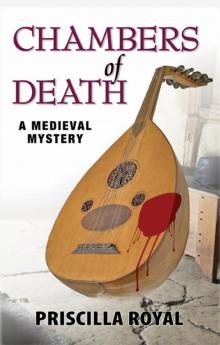 Chambers of Death mm-6
Chambers of Death mm-6 Forsaken Soul
Forsaken Soul Covenant With Hell (Medieval Mysteries)
Covenant With Hell (Medieval Mysteries)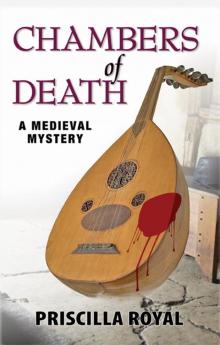 Chambers of Death
Chambers of Death Tyrant of the Mind
Tyrant of the Mind Wild Justice
Wild Justice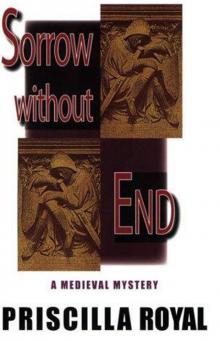 Sorrow Without End
Sorrow Without End Wine of Violence
Wine of Violence Tyrant of the Mind mm-2
Tyrant of the Mind mm-2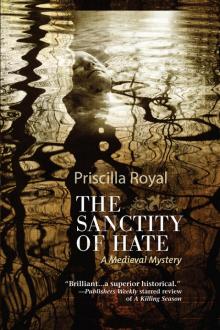 The Sanctity of Hate
The Sanctity of Hate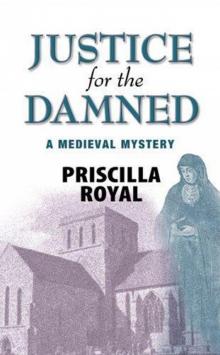 Justice for the Damned
Justice for the Damned The Proud Sinner
The Proud Sinner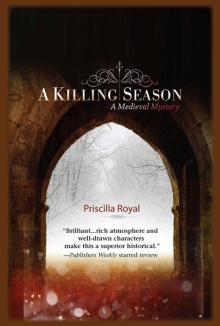 A Killing Season mm-8
A Killing Season mm-8 Forsaken Soul mm-5
Forsaken Soul mm-5 Valley of Dry Bones mm-7
Valley of Dry Bones mm-7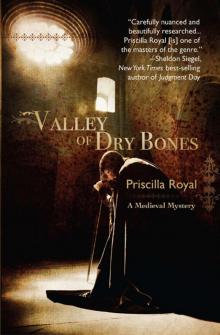 Valley of Dry Bones
Valley of Dry Bones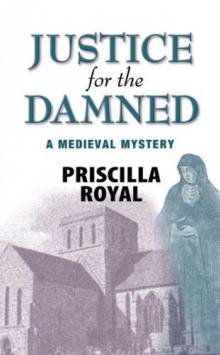 Justice for the Damned mm-4
Justice for the Damned mm-4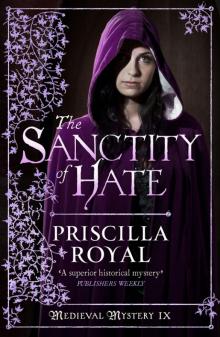 Sanctity of Hate
Sanctity of Hate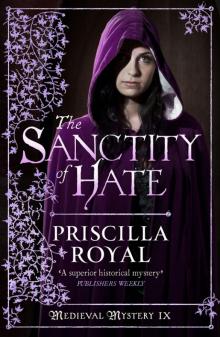 Sanctity of Hate mm-9
Sanctity of Hate mm-9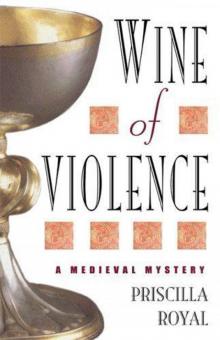 Wine of Violence mm-1
Wine of Violence mm-1